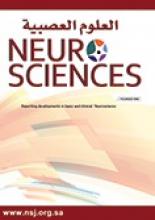To the Editor
We have read with interest the recent manuscript on neurophobia by Abulaban et al.1 We agree with the authors that there is a shortage of medical students who continue to pursue careers in clinical Neurosciences. This is further exacerbated by the discomfort, so termed “neurophobia”, noted by most medical students in addressing neurological disorders, a concept supported by the authors’ study, and proposed by others.2,3 There is value in evaluating these attitudes as the degree of neurophobia may not be consistent between different countries or regions.4 In addition to students attitudes, the structure of the Neuroscience curriculum may contribute to students choosing to pursue additional training in clinical Neurosciences.5 The current study reports on 422 medical students and interns completing the survey. Most respondents felt that neurology is a difficult topic, and many ascribe this to insufficient knowledge and/or poor teaching. A minority of students and interns felt that their neurology knowledge was sufficient. What is of particular interest in the authors’ current study is the high percentage of trainees who are open to pursuing careers in Neurology early on in their training. Only 17.9% of 4th year medical students disagree with considering Neurology as a future career option. This provides a window of opportunity for recruitment to the clinical Neurosciences by capitalizing on students’ views of Neurology as challenging, but also interesting. Further investigation into the factors that lead students to pursue careers in clinical Neurosciences will augment the studies which help clarify what drives them away.
Reply from the Author
We sincerely appreciate your invaluable comments on our work. Neurophobia still prevails among medical students and residents. Ways to solve this problem are still challenging. We believe that more medical students involvement in elective neuroscience specialty will have positive impact on their perception about the field.5 The window of opportunity as you suggested is potential for catching the attention of medical students before they become more neurophobic. We can see that only 17.9% disagree to consider neurology as a future career option. This percentage gradually increased over the years, and changed from 17.9% to 24.2% for 5th year medical students and interns, 45.7% and 47.9% for the 6th year medical students and interns. The reason for this is unclear, but we hypothesize that the more they get experience, the lesser the neurophobia. On the other hand, we need to consider that there is potential selection bias in this cohort as around 63% of the participants were from a neurology, teaching conference for non-neurologists, as mentioned in the original manuscript.
Ahmad A. Abulaban, Tahir H. Obeid
Neurology Division, Department of Medicine, King Fahad National Guard Hospital, King Abdulaziz Medical City, Riyadh, Kingdom of Saudi Arabia
- Copyright: © Neurosciences
Neurosciences is an Open Access journal and articles published are distributed under the terms of the Creative Commons Attribution-NonCommercial License (CC BY-NC). Readers may copy, distribute, and display the work for non-commercial purposes with the proper citation of the original work.






